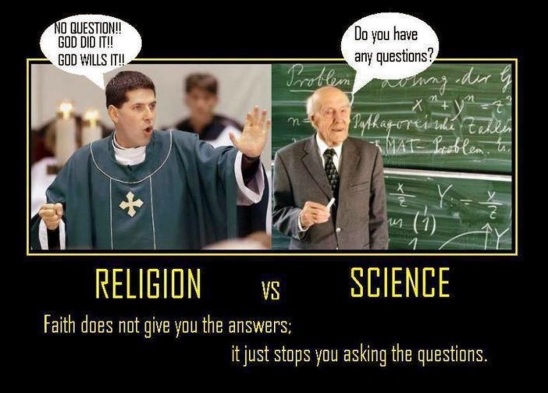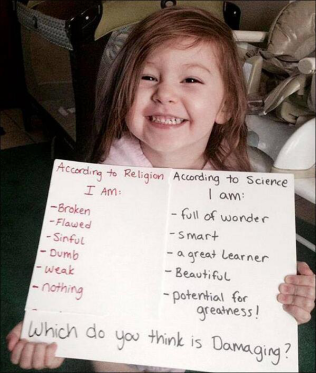
It is heard often that religion and science are “compatible.” The idea advocated by Stephen Jay Gould is that they occupy “non-overlapping magesteria” (NOMA). But is it really true?
It is true that many religious people accept science. My parents, who are both Catholics, accept evolution over creationism, medicine over faith healing, astronomy over astrology, and the list goes on. Francis Collins, the scientist known for the Human Genome Project, is a Christian. And there are a lot of people like this. They say that science does not interfere with their beliefs and that they are not incompatible with each other.
But is it really true?
Richard Dawkins, evolutionary biologist and well-known atheist, covered this topic in his book The God Delusion, and talks about it in various debates and interviews. Dawkins argues that both science and religion are attempts to answer the same questions (the difference being that “religion often gets the answers wrong”), and therefore they cannot be NOMA. Furthermore, if they are both attempting to answer the same questions, they cannot both be right at the same time – especially as many religious beliefs are in direct contradiction to well-established scientific findings.
So when science and religion are in contradiction, which one will the NOMA advocates get behind? They certainly can’t accept both and say that science and religion don’t clash – if information from both sides is contradictory, at least one is certainly wrong. But how can they accept one over the other and still say that science and religion do not interfere with each other?
A dear friend of mine, who was once a Christian creationist but has recently come to have a love for science and now accepts evolution as fact, often states that while she remains a theist her enthusiasm for science doesn’t get in the way. But doesn’t the fact that she is no longer a creationist demonstrate that science does get in the way of her beliefs? Did she not have to change her mind about creationism, throwing out Genesis outright, in order to accept evolution?
For me, and many others, the incompatibility of science and religion goes deeper than just contradictory information. It lies within the contradictory mindsets taught and methods used between the two.

Science tells you to always think for yourself, and when you don’t know something to go and find out, whereas religion indoctrinates people from as early an age as possible, drumming the beliefs into them before they are old enough to think for themselves. The late intellectual and debate heavyweight Christopher Hitchens said, “If religion was not taught to a child until they had attained the age of reason, we would be living in a rather different world.”
In science, when there is new information that proves a previous idea wrong, you are encouraged to rethink that idea; in religion, no matter what new information is provided that disproves your belief you must remain ignorant – despite all the evidence pointing to a 4.5 billion year-old Earth, many Christian denominations insist that you must believe that the Earth is less than 10,000 years old.
Science encourages people to question, and will even award you with a prize if you can prove someone wrong; religion threatens people who even attempt to question with eternal torment in Hell (of course many people, atheist and religious alike, don’t believe in Hell and see this as an empty threat, but to the religious authority and millions of believers the threat of eternal torture after death is very real and it will influence them), and when they have the power to they will kill you if you prove them wrong.
Nothing in science is “sacred” and is open to change based on new observations; religion is full of “sacred” laws and “truths” that are, like their god(s), unchanging and unchallengeable. Science encourages you to solve problems by taking direct action; religion tells you to pray and hope that God will solve your problem, and that if he doesn’t then God must have a plan for you. (As the late George Carlin said, “If God’s just gonna do what he wants to anyway, why the fuck are you praying in the first place? Seems like a waste of time to me!”)
Science is based upon evidence,and when there is no evidence to support a hypothesis it is concluded that such a hypothesis is unlikely to be true – though science will always keep the door open in case evidence does ever arrive; religion is based upon faith – belief without evidence to support it – and even if there is evidence against you, you must still believe – or else!
Science is open to different ideas and encourages anyone from any faith or background to put their ideas on the table – nobody is discarded out of hand for being Jewish, black, female, gay, lesbian, transgender, etc; religion pushes its beliefs on everybody, and is not satisfied unless everyone adheres to “the truth of the Bible/Quran/etc” – and not just any, but their version of said “truth” – and if you do not believe exactly as they do, you are ostracised, discriminated against and looked upon as lower-class citizens who deserve less rights than them simply for believing differently (even if you believe in the same god!) or not believing at all. Only one opinion is allowed – theirs – and even being in the same family won’t necessarily protect you from being cut off, disowned, hated and thrown out onto the streets.
Science appeals to facts and observation; religion appeals to authority, emotion, threats and, when it has the power, violence. Science will do what it takes to find out the truth; religion will do what it takes to shield its followers away from the truth. Religious members of the US Congress do whatever they can to block bills that are in support of science and defund space exploration programs, climate change research and so on.
While the scientific community will never resort to violence in an attempt to correct religious views, inter-faith conflict is a leading cause of war and unnecessary death. What would the rationale be for suicide bombing and genital mutilation if it were not for a belief that your god thought it was right? What would the justification be for the hacking to death of secular bloggers in Bangladesh if it were not for believing that your god commands you to kill unbelievers? What would be the warrant for Christians looking down on everybody who is not like them were it not written in the Bible that they are God’s “chosen people”?
In the end I would like to make one last note. It is not the purpose of my writings to put anybody down for what they want to believe in. Everyone should be free to believe in whatever they want, as long as they do not force everyone else to believe the same way. If you are a believer and having read up to here you still want to continue in your belief, that’s up to you – but I just wanted to show you how, in my view, science and religion are not just in contradiction with each other when it comes to facts but in the very core of their systems.
Godless Aspie



